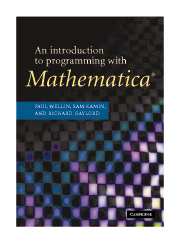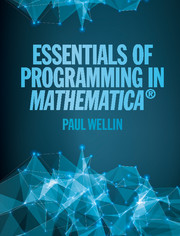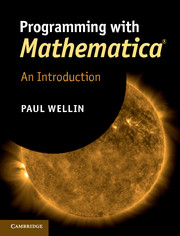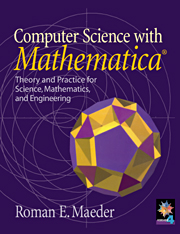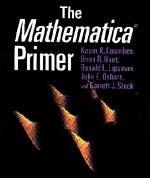An Introduction to Programming with Mathematica®
Starting from first principles, this book covers all of the foundational material needed to develop a clear understanding of the Mathematica language, with a practical emphasis on solving problems. Concrete examples throughout the text demonstrate how Mathematica can be used to solve problems in science, engineering, economics/finance, computational linguistics, geoscience, bioinformatics, and a range of other fields.
The book will appeal to students, researchers and programmers wishing to further their understanding of Mathematica. Designed to suit users of any ability, it assumes no formal knowledge of programming so it is ideal for self-study. Over 290 exercises are provided to challenge the reader's understanding of the material covered and these provide ample opportunity to practice using the language. Mathematica notebooks containing examples, programs and solutions to exercises are available from www.cambridge.org/wellin.
- Comprehensive introduction to programming in Mathematica, including the latest version, written by experts in the field
- New chapters written to incorporate new features in Versions 4 through 5.1
- Future updates, Mathematica notebooks and solutions to the hundreds of exercises are available at www.cambridge.org/0521846781
Reviews & endorsements
"Essential...a welcome addition to the literature. The choice of topics and their presentation are lucidly informed by considerable experience. The writing style is straightforward and clear. The authors stick resolutely to their goal of producing an introductory text, not a complete treatment, on programming in Mathematica. As such it is highly successful, full of useful examples that show how the ideas can be immediately and fruitfully exploited."
The Mathematica Journal
"The two introductory chapters on the Mathematica language provide a wonderful, and very clear, introduction to use on the beginners level...The chapter introducing the language does a masterful job of covering many of the most important features in just 21 pages, truly remarkable given the breadth and depth of the language...Part of the value here is that the authors do not merely provide a few sample programs, but actually take the time to detail the value of writing your own. Once the novice becomes familiar with the basic concepts, tests of understanding are provided by chapter exercises."
Scientific Computing
"...Familiar with Mathematica this would be an excellent self study text to improve their understanding of how to use its considerable range of programming tools...Also there are exercises and solutions as well as a couple of useful appendices on how Mathematica performs its calculations and debugging. It would thus seem an excellent course text."
S French, Journal of the Operational Research Society
Product details
May 2005Adobe eBook Reader
9780511079108
0 pages
0kg
65 b/w illus. 280 colour illus. 20 tables 290 exercises
This ISBN is for an eBook version which is distributed on our behalf by a third party.
Table of Contents
- 1. An introduction to Mathematica
- 2. The Mathematica language
- 3. Lists
- 4. Functional programming
- 5. Procedural programming
- 6. Rule-based programming
- 7. Recursion
- 8. Numerics
- 9. Graphics programming
- 10. Front-end programming
- 11. Examples and applications
- 12. Writing packages
- Appendix A: how expressions are evaluated
- Appendix B: debugging.

